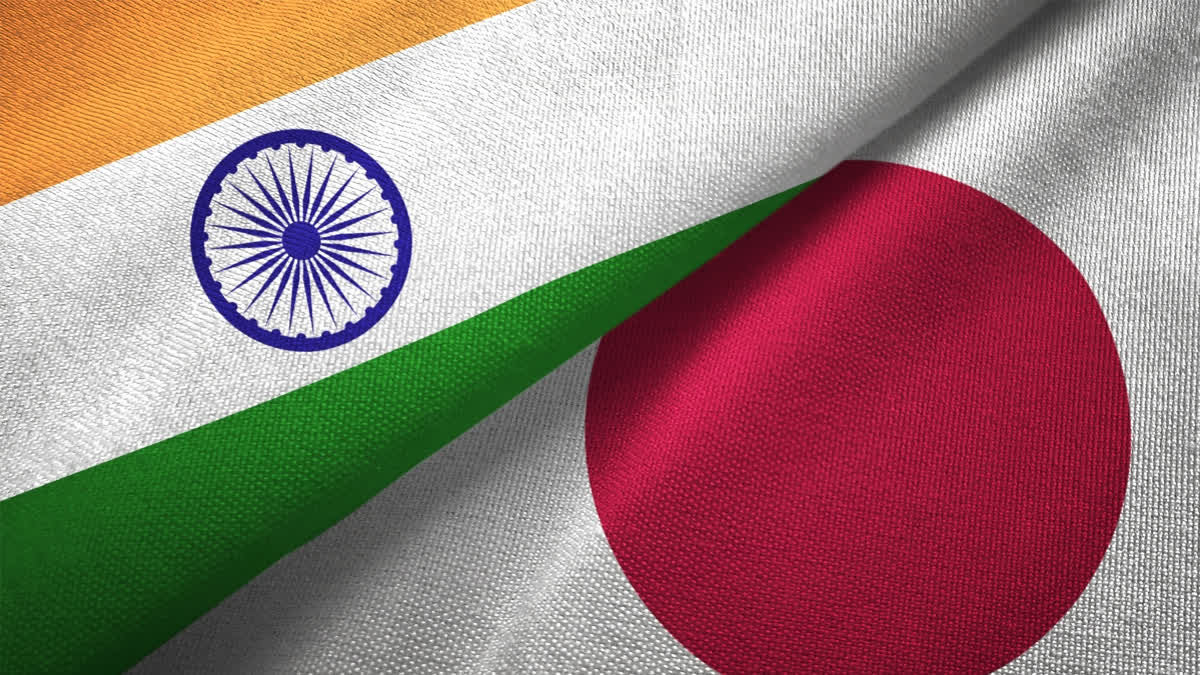New Delhi: With the third round of the India-Japan 2+2 Dialogue scheduled to be held here on August 20, defence cooperation, especially between the navies of the two countries, is expected to be high on the agenda.
During his regular media briefing earlier this week, External Affairs Ministry spokesperson Randhir Jaiswal said that while India will be represented by External Affairs Minister S Jaishankar and Defence Minister Rajnath Singh, the Japanese side will be represented by Foreign Minister Yoko Kamikawa and Defence Minister Minoru Kihara. The first and second rounds of this dialogue were held in 2019 in New Delhi and in 2022 in Tokyo respectively.
"Getting the foreign ministers of the two countries and also the defence ministers of the two countries on the same platform will give a major boost to all aspects of our relationship including political, defence, security and strong economic ties and other ties that we share with Japan," Jaiswal said.
India-Japan relations were elevated to 'Global Partnership' in 2000, ‘Strategic and Global Partnership’ in 2006, and ‘Special Strategic and Global Partnership’ in 2014. Japan is one of only two countries with which India holds annual bilateral summits, the other being Russia.
Media reports suggest that expanding collaboration in defence equipment and technology will be a top priority during the upcoming 2+2 Foreign and Defence Ministers’ Meeting. Naval cooperation will be especially in focus. According to a report in Nikkei Asia, Japan is likely to offer to India the NORA-50 naval ship communication antenna.
Both India and Japan are part of the Quad which also includes the US and Australia seeking to ensure a free and open Indo-Pacific in the face of Chinese hegemony in the region that stretches from the east coast of Japan to the east coast of Africa.
So, what is the NORA-50 naval ship communication antenna?
The NORA-50 is a state-of-the-art naval ship communication antenna system developed by a group of Japanese companies including electronics maker NEC and Yokohama Rubber. The antenna system is designed for use on naval vessels, providing advanced communication capabilities in challenging maritime environments.
The NORA-50 was developed to meet the increasing demands for secure and reliable communications on modern naval ships. As maritime operations have become more complex, with the need for better coordination among ships, aircraft, and ground forces, the NORA-50 was designed to ensure seamless communication under various conditions, including during electronic warfare.
The NORA-50 system is currently being installed on the Mogami-class frigates of the Japanese Maritime Self-Defence Force (JMSDF)). In addition, there is a possibility that these will be considered for integration into Japan’s Next Generation Offshore Patrol Vessel (OPV) programme.
Why is the NORA-50 system so special?
The NORA-50 integration mast, dubbed ‘UNICORN’ (UNIted Combined Radio aNtenna), has a bar-shaped dome that houses the antennas for tactical data link, Tactical Air Navigation System (TACAN), and communications. According to the Japanese Ministry of Defence’s Acquisition, Technology and Logistics Agency (ATLA), UNICORN has a shape designed to reduce the radar cross section (RCS), which makes it stealthy.
The NORA-50 covers a broad frequency range, allowing it to support multiple communication bands. This flexibility is crucial for naval operations that require communication over both short and long distances.
The antenna system has an omnidirectional radiation pattern, which means it can transmit and receive signals in all directions. This is particularly important for ships that need to maintain communication with multiple stations, including other ships, aircraft, and satellites, without constantly reorienting the antenna.
The NORA-50 is compact and lightweight compared to older models, which is a significant advantage for naval vessels where space and weight are at a premium. Despite its compact size, the antenna offers high performance and durability. The antenna is constructed from advanced composite materials that resist corrosion and withstand harsh maritime environments.
Other features of the NORA-50 include automatic tuning capabilities, allowing it to quickly adjust to different frequencies as needed. This is especially useful in dynamic operational environments where communication needs can change rapidly.
The antenna system incorporates advanced filtering technologies to minimise interference and ensure clear signal transmission. This is critical in crowded electromagnetic environments, such as during joint military exercises or combat operations.
In modern naval warfare, communication systems are often targeted by electronic jamming. The NORA-50 is designed with anti-jamming features, ensuring that communications remain secure and reliable even in the presence of electronic warfare threats.
Why will Japan’s supply of the NORA-50 to India further boost defence cooperation between the two sides?
India-Japan defence and security partnership forms an integral pillar of bilateral ties. India-Japan defence exchanges have gained strength in recent years due to growing convergence on strategic matters and its significance is growing from the common outlook on issues of peace, security and stability of the Indo-Pacific Region.
A Joint Declaration on Security Cooperation (JDSC) between India and Japan was signed in 2008, a Memorandum of Defence Cooperation and Exchanges was signed in 2014, an Agreement on the Transfer of Defence Equipment and Technology Cooperation and an Agreement on Security Measures for Protection of Classified Military information were signed in 2015 and Implementing Arrangement for Deeper Cooperation between Indian Navy and JMSDF was signed in 2018. An Agreement on Reciprocal Provision of Supplies and Services (RPSS) between the Self-Defence Forces of Japan and the Indian Armed Forces was signed on September 9, 2020.
Coming to naval cooperation, the Indian Navy and JMSDF interact bilaterally during JIMEX (Japan-India Maritime Exercise) every year in addition to meeting in multilateral settings of exercises MALABAR and MILAN.
It is in view of all this that the NORA-50 deal, if it goes through, will give a significant boost to India-Japan defence cooperation.



